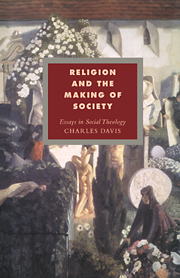Book contents
- Frontmatter
- Contents
- General editors' preface
- Acknowledgements
- Introduction: from the secular to the supernatural
- PART I Society, religion and human agency
- PART II Praxis, narrative and religious language
- PART III From the modern subject to the postmodern self
- PART IV The option for the future
- 10 What remains of socialism as a moral and religious ideal
- 11 Communicative rationality and the grounding of religious hope
- Index
- Cambridge Studies In Ideology And Religion
11 - Communicative rationality and the grounding of religious hope
Published online by Cambridge University Press: 18 December 2009
- Frontmatter
- Contents
- General editors' preface
- Acknowledgements
- Introduction: from the secular to the supernatural
- PART I Society, religion and human agency
- PART II Praxis, narrative and religious language
- PART III From the modern subject to the postmodern self
- PART IV The option for the future
- 10 What remains of socialism as a moral and religious ideal
- 11 Communicative rationality and the grounding of religious hope
- Index
- Cambridge Studies In Ideology And Religion
Summary
A distinctive, recurrent theme of Christian theology today is that of hope. It is a constitutive feature of Latin American Liberation Theology, which, as in the title of Ruben Alves's classic study, can be designated A Theology of Human Hope. As for German political theology, one of its chief exponents, Jürgen Moltmann, gave it the programmatic title, Theology of Hope; and hope is such a prominent theme in the theology of its other representative, Johann Baptist Metz, that a study of his thought is entitled Christliche Hoffnung und menschlicher Fortschritt.
Both Moltmann and Metz have been influenced by Bloch more than by the older Frankfurt School, as represented by Horkheimer and Adorno or by Jürgen Habermas. Ernst Bloch's Das Prinzip Hoffnung has had a much greater impact upon theologians than upon Marxists, even of the Western variety. Its influence upon German political theology has been profound and decisive. Outside theological circles Bloch's thought is scarcely treated even with respect. Kolakowski dubs his work ‘a futuristic gnosis’ and writes contemptuously: ‘Certainly at times the reader feels as though he were amid the fumes of an alchemist's laboratory, and when he reduces the poetic verbiage to everyday terms he may find it sterile and commonplace'. One would hardly expect Horkheimer and Adorno as critical theorists to be much taken with Bloch's work, because their thought is more aptly called a philosophy of despair than a philosophy of hope.
What about Habermas? He, too, refers to Bloch as agnostic, but also more respectfully as a Marxist Schelling. (It should be remembered that Habermas wrote his doctoral thesis on Schelling.) Nevertheless, a rejection is implied in the designation.
- Type
- Chapter
- Information
- Religion and the Making of SocietyEssays in Social Theology, pp. 188 - 205Publisher: Cambridge University PressPrint publication year: 1993

